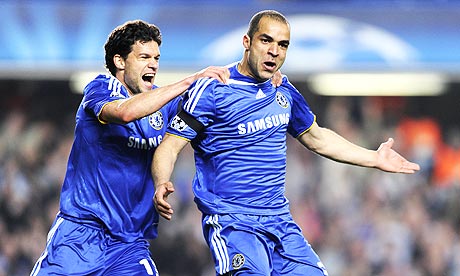
Chelsea will formally confirm their intention to appeal Fifa's decision to ban them from registering new players until 2011 by Friday's deadline, ahead of presenting their case to the Court of Arbitration for Sport in Lausanne, though it is not just the club's lawyers who have been working feverishly on issue of paperwork this week. While fears persist over the ramifications of the Gaël Kakuta judgment, the Premier League leaders, wary of the worst-case scenario, have occupied themselves by tying their current playing squad down to longer-term deals.
It is as if Stamford Bridge has been working ahead of its own internal transfer deadline in recent weeks. The rush of players committing their futures to the club – Didier Drogba, John Terry, Michael Mancienne, Ashley Cole, Mikel John Obi, Hilário and Florent Malouda – may have begun well in advance of Fifa's ruling, which caught the Chelsea hierarchy unawares when it was announced in the first week of September. Yet it has been maintained with fringe players following suit in recent days, the third-choice centre-half Alex following the back-up forward Salomon Kalou by signing on this week.
There is a clear logic to the club's strategy. This squad boast undoubted quality for all that they have been the nearly men in both Premier and Champions Leagues in recent seasons. It is hoped that Carlo Ancelotti might be the man to edge those same players from second to first place, or runners-up to winners, to remind them of what they were capable of achieving under José Mourinho not that long ago, hence the desire to offer extensions and renewals over the summer. The Kakuta ruling merely sped up the process. Should Chelsea be banned from registering new players in the next two windows, then the nightmare scenario was always that current first-team squad players nearing the end of their deals might seek pastures new and rob the London club of the depth in talent from which they currently benefit.
In many ways, players such as Kalou and Alex were in no-lose situations. Chelsea, for all their bullish optimism that the Kakuta ban can either be overturned or reduced to a single window, have to assume the worst when it comes to re-negotiations, leaving the players in enviable bargaining positions. Ancelotti may not have seen Alex play a competitive game in Chelsea colours yet – the Brazilian has been dogged by a groin injury all season that required surgery – but his pedigree, together with Kalou's versatility, precedes him. These were more than useful players to retain, and might have been rendered awful losses had they been allowed to leave with the club left with no prospect of replacing them.
Others will follow suit in the months to come. Joe Cole is anxious to secure some first-team football under his belt before putting pen to paper on a new deal, with his current contract due to expire at the end of the season, and Michael Ballack – who triggered a one-year extension in the summer – might be persuaded to commit to longer terms. The initial plan not to open talks with Nicolas Anelka, who has entered the final two years of his agreement at Stamford Bridge, is expected to be reviewed with the France international enjoying a purple patch of form and with him established as one of the more potent forwards in the Premier League.
While the uncertainty over the Kakuta punishment persists, the multi-million pound transfer dealings that used to illuminate this pocket of south-west London are limited to bonanzas for the existing personnel. The Fifa ban initially appeared to offer real hope to the club's academy players anxious to break through into the first team. That it may do, but it will benefit the current crop of senior professionals even more.

